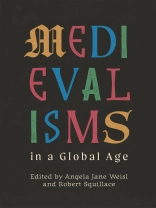Discusses contemporary medievalism in studies ranging from Brazil to West Africa, from Manila to New York.
Across the world, revivals of medieval practices, images, and tales flourish as never before. The essays collected here, informed by approaches from Global Studies and the critical discourse on the concept of a ‘Global Middle Ages’, explore the many facets of contemporary medievalism: post-colonial responses to the enforced dissemination of Western medievalisms, attempts to retrieve pre-modern cultural traditions that were interrupted by colonialism, the tentative forging of a global ‘medieval’ imaginary from the world’s repository of magical tales and figures, and the deployment across borders of medieval imagery for political purposes. The volume is divided into two sections, dealing with ‘Local Spaces’ and ‘Global Geographies’. The contributions in the first consider a variety of medievalisms tied to particular places across a broad geography, but as part of a larger transnational medievalist dynamic. Those in the second focus on explicitly globalist medievalist phenomena whether concerning the projection of a particular medievalist trope across borders or the integration of ‘medieval’ pasts from different parts of the globe in a contemporary incarnation of medievalism. A wide range of topics are addressed, from Japanese manga and Arthurian tales to The O-Trilogy of Maurice Gee, Camus, and Dungeons and Dragons.
Зміст
Introduction: Medievalisms: Local Spaces and Global Geographies
Part I: Local Spaces
1. Metamorphosis Metamorphosed: Fox Daemon, (Anti-)Colonialism, and Global Medievalism in Ken Liu’s ‘Good Hunting’ – Minjie Su
2. The Medievalist Simulacra of Kafka’s The Castle in Graphic Adaptations – Elizabeth Allyn Woock
3. Mangaesque Knights: Japan’s Path to Global Medievalism – Maxime Danesin & Manuel Hernández-Pérez
4. The Good, the Bad, and the Ugly in Maurice Gee’s The O Trilogy – Anna Czarnowus
5. Trading a Bow for a Machine Gun: Robin Hoods, Nationalism and the Personas of Philippine Politics – Stefanie Matabang
6. Tropical Templars? Medievalism and Pseudohistory in Brazil’s Largest City – Luiz Guerra
7. Plague Temporality and Chronicle in Camus’s La peste – Sara Torres
8. The Griot in Sunjata: A Paradigmatic Herald of an Afrofuturistic Messianic Age – Joseph Osei-Bonsu
9. Toward a Place-Based, North Pacific Medieval Studies: Medievalism, Pedagogy, Indigeneity – Daniel T. Kline
Part II: Global Geographies
10. Revolt: ‘Peasants’ and Protest in the Twenty-First Century – Matthias D. Berger
11. ‘Taking a Step Back into the Thirteenth Century’: Reading the Globe through a Medieval Lens: In the Footsteps of Marco Polo – Kara L. Mc Shane
12. A Pinch of Flour, a Cup of Tall Tales, and one Khaleesi: Getting Medieval Across Time and Space – Meriem Pagès
13. The Boys Are Back in Town: Capital One’s Propagandic Commercials for Alt-Right Nostalgic Imperialism – Carol Robinson
14. Memes, Covid-19, and Global Medievalism – Andrew B.R. Elliott
15. Dichotomies of Arthurian Medievalism: Dismantling and Reinforcing the Status Quo – Rachael Warmington
16. Thor versus Juracán: Premodern Storm Gods and Goddesses in Popular Culture – Marian E. Polhill
17. Geo-mapping the In-Betweens: Medieval Daoist Correlatives in Pokémon Go – Anne Giblin Gedacht
18. Worldbuilding Dungeons and Befriending Dragons: How the Global TTRPG Community Combats Western Hegemony – Miranda Hajduk
19. Marrying Medievalism, Post-Apocalypse, and the Global in Digital Games – Emily Price
List of Contributors
Index
Про автора
ANGELA JANE WEISL is Professor of English and Chair of the English Department at Seton Hall University.












